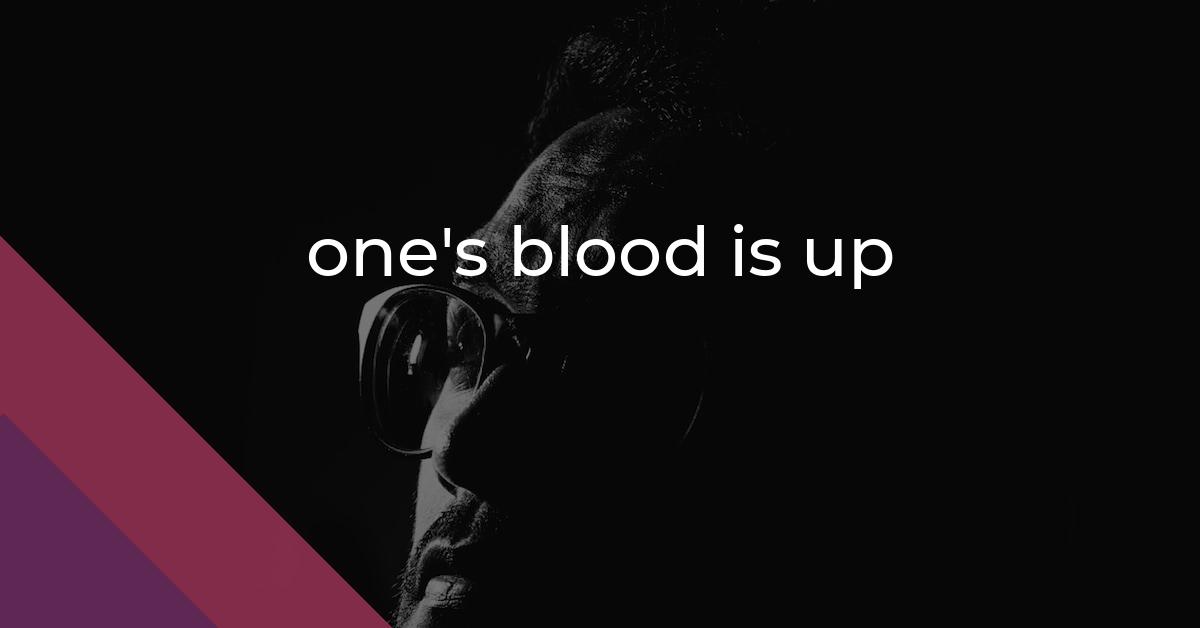one’s blood is up: Idiom Meaning and Origin
What does ‘one's blood is up’ mean?
The idiom "one's blood is up" means to be extremely angry or excited, often as a result of feeling provoked or challenged. It is a figurative expression that suggests a heightened state of emotion or intensity.

Idiom Explorer
The idiom "shed blood" means to cause someone to bleed or to spill one's own blood in a violent or harmful way, often as a result of conflict, warfare, or injury.
The idiom "scream bloody murder" means to loudly and passionately protest or complain about something, often in an exaggerated or overly dramatic manner.
The idiom "run high" refers to when emotions or tensions are intense or reaching a peak level. It describes a situation where feelings, such as anger, excitement, or anxiety, are strong and powerful.
The idiom "raise someone's hackles" means to make someone very angry or annoyed.
The idiom "raise one's voice" means to speak louder or shout in order to be heard or make one's point more emphatically.
The idiom "put someone's back up" means to annoy or irritate someone, often causing them to become defensive or confrontational.
The idiom "psyched up" means to be mentally prepared, excited, or motivated for a particular event or challenge.
The idiom "pour one's heart out" means to confide or express one's deepest and most sincere emotions or thoughts to someone else.
Fiery Surge
The idiom "one's blood is up" is a commonly used phrase in the English language. It is usually used to describe a state of heightened emotion or anger in an individual. The phrase implies that someone's blood has become heated or agitated, often due to a provocation or a sense of injustice.
The exact origins of this idiom are uncertain, just as with many other idiomatic expressions. However, it is believed to have originated from older idioms and phrases that described the physical response of the body to strong emotions. One such phrase is "make someone's blood boil," which dates back to at least the 17th century.
The idiom "make someone's blood boil" is similar in meaning to "one's blood is up." It is used to describe a situation or an action that makes someone extremely angry or furious. The use of the word "boil" creates a vivid image of intense anger, as if the person's blood is literally boiling inside their veins.
The related idiom "out for blood" is used to describe someone who is seeking revenge or actively pursuing someone else in a hostile or aggressive manner. When someone is "out for blood," they are determined to cause harm or punish someone for a perceived wrongdoing. This idiom reflects the idea that someone's blood is metaphorically up, meaning that their anger or aggression has reached a boiling point.
The phrase "shed blood" is commonly used to describe acts of violence or warfare in which blood is spilled. It refers to the physical act of blood being shed or spilled, often as a result of a conflict or a battle. This idiom emphasizes the seriousness and consequences of a situation, suggesting that it has escalated to the point of violence or harm.
The idiom "run high" is often used to describe emotions or tensions that are intense and heightened. When emotions "run high," people are experiencing strong feelings, such as anger, excitement, or anxiety. This idiom suggests that emotions are not just present, but they are running at a high or heightened level, further emphasizing the intensity of the situation.
In contemporary usage, the idiom "one's blood is up" is often used figuratively rather than literally. It is a metaphorical expression that reflects the idea that strong emotions can have a physical effect on the body, specifically on the circulation of blood.
The idiom "one's blood is up" is commonly used in various contexts, such as in sports to describe a player who is particularly aggressive or motivated. It can also be used to describe a person who is deeply passionate or emotionally invested in a certain cause or issue. The idiom is often used to convey a sense of intensity and determination.
Overall, the idiom "one's blood is up" reflects the complex relationship between emotions and physical sensations. It illustrates how language is often used to convey the intricate nuances of human experience. While the exact origins and etymology of the idiom may remain elusive, its meaning and usage continue to resonate with individuals across different contexts and scenarios.
Example usage
Examples of how the idiom "one's blood is up" can be used in a sentence:
- When the opposing team scored a goal, you could see that his blood was up as he aggressively tried to regain control of the ball.
- Her blood was up during the argument, and she couldn't help but raise her voice and become confrontational.
- With his blood up, he charged into the fight without considering the consequences.
More "Emotion" idioms



